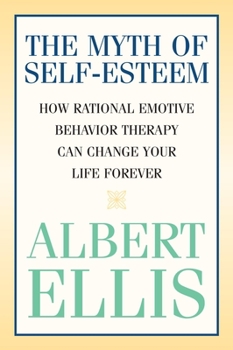The Myth of Self-esteem: How Rational Emotive Behavior Therapy Can Change Your Life Forever
Select Format
Select Condition 
Book Overview
In this illuminating book, Ellis provides a lively and insightful explanation of the differences between self-esteem and self-acceptance. Emphasizing the importance of self-acceptance, he examines this theme in the thinking of great religious teachers, philosophers, and psychologists. He then provides exercises for training oneself to change self-defeating habits to the healthy, positive approach of self-acceptance. These include specific thinking techniques as well as emotive and behavioral exercises.He concludes by stressing that unconditional self-acceptance is the basis for establishing healthy relationships with others, along with unconditional other-acceptance and a total philosophy of life anchored in unconditional life-acceptance.
Format:Paperback
Language:English
ISBN:1591023548
ISBN13:9781591023548
Release Date:October 2005
Publisher:Prometheus Books
Length:344 Pages
Weight:1.08 lbs.
Dimensions:0.7" x 6.1" x 9.0"
Customer Reviews
4 ratings
Great Transaction
Published by Thriftbooks.com User , 15 years ago
Everything went well, the product arrived on time, and in the condition I was expecting.
`self-esteem' nuts
Published by Thriftbooks.com User , 15 years ago
Many Americans are `self-esteem' nuts. They have been obsessed for long time to seek building and enhancing `self-esteem'. But what is `self-esteem' anyway? Typically, in the mind of most people in America, it means `overall rating of your worth as a person'. If you're an intelligent person capable of critical thinking and are willing to seriously think about the concept of this `self-esteem' stuff, you'll tend to feel that it's very confusing. `I speak very well, so I feel good about my self'; then `I'm overweight, so I feel lousy about myself'; then `my school grade is A+, so I'm better than most people in the class'; then `I failed to enroll in Harvard, what a loser I am'; then `Cathy didn't invite me for her wedding, so I must be not good enough, I feel depressed', etc, etc. So, how much is your 'total worth'? No wonder so many people's `self-esteem' is in the hands of other people. In order to rate your `total worth' (self-esteem) against other people, you have to enlist all of your strength and weakness and opinion of every people you know, and enlist all the attributes of other people you can imagine, and weigh them on a magic balance. How this is possible? What's your overall worth to yourself? THIS IS IMPOSSIBLE! It's absurd to rate your `total worth'. It's absurd that `your total worth' depends on comparison with and opinion of other people. As a person, you value your own existence, care for your own needs and naturally want to enjoy your life. So, based on reality, naturally you want to develop some skills and abilities to earn a decent living and also to seek to realize you potential. That's all. You're not perfect (not even close to being perfect). No one really is. You don't have to rate your `total worth'. The `total self-worth' in public eyes is really an arbitrary foolish idea. This book powerfully refutes this `total self-worth' myth. But considerable intelligence is required on a reader's part to fully understand the content of the book. I would not be surprised if only a small proportion of people in America can truly understand and appreciate this book.
Just what is self-esteem?
Published by Thriftbooks.com User , 18 years ago
Just what is self-esteem? Many believe we must have it; but here's a famous psychologist to say it's all a myth, and he bases his contention on the thoughts of some of the finest religious thinkers and philosophers of our times. Instead Albert Ellis in THE MYTH OF SELF-ESTEEM (1591023548 ) explains his Rational Emotive Behavior Therapy as an alternative to achieve unconditional self-acceptance, using exercises which promote such acceptance over the more commonly held self-esteem.
The mantra of "Self Esteem"
Published by Thriftbooks.com User , 19 years ago
Albert Ellis performs a valuable service with this book. The mantra of "Self Esteem" has indeed become pervasive in today's society, but not due to Dr. Ellis. We are told that some children don't do well in school because they suffer from "low self-esteem," that people commit crimes for the same reason, and that if we can only figure out how to universally raise people's self esteem, all societal problems will vanish. Last night I was reading the old book "Do What You Love, the Money Will Follow" (not written by Dr. Ellis). Good title, but by the second chapter, the author starts implying that if we're not in work we love, it must be because we suffer from (you guessed it) "low self-esteem." The rest of the book is devoted to telling us how we can supposedly "raise" it. Ellis' point is that "self-esteem" is NOT the root cause of all mental problems, contrary to what many self-help "experts" tell us. In fact, "self-esteem" can even be counter-productive. If you have high self-esteem, for example, you may think that you "deserve" to be happy, satisfied and fulfilled no matter what job you have or what circumstances you are in. Dr. Ellis' point is that we must get away from obsessing over "self-esteem," both as individuals and as a society, and start dealing with the real false beliefs that cause us distress. This book is not so much about not trying to achieve significant things in life as it is about not blaming ourselves when we fail, as we occasionally will.






